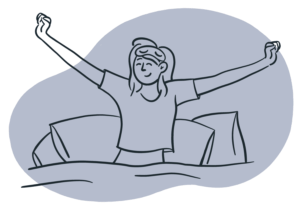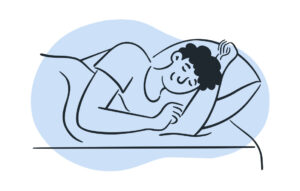What is a Circadian Rhythm?
Disclosure: By clicking on the product links in this article, Mattress Nerd may receive a commission fee at no cost to you, the reader. Read full disclosure statement.
Why do some of us rise with the sun or stay awake into the wee hours of the night? Why can some of us jump out of bed at the crack of dawn while others can barely muster the energy to climb out of bed after snoozing the alarm three times? The answer lies within our body’s internal clock known as our circadian rhythm.
A circadian rhythm, sometimes called our sleep/wake cycle, is the body’s internal “clock” that regulates when we feel sleepy and wakeful over a 24-hour cycle. But it does much more than that. Our circadian rhythm orchestrates the function of a number of other systems and cells that determine things like our energy levels and hunger throughout the day. In fact, circadian clocks are found in the liver, heart, and brain, and in almost all our organ systems. These clocks modify processes at the cellular level that are specific for each tissue. In addition to affecting sleep-wake cycles, circadian rhythms can influence the release of hormones, body temperature, and eating habits and digestion.

How Do Circadian Rhythms Work?
Our circadian clocks function thanks to a master clock in a tiny region of the brain, the suprachiasmatic nucleus (SCN), found in the hypothalamus. The SCN takes its cues from light filtered through the eyes to keep different biological processes in your body in synch. It reacts to both lightness and darkness.
When it starts to get dark, the SCN triggers your body to start producing melatonin, which will help you become tired enough to sleep. On the other hand, when faced with sunlight, or another source of artificial light, melatonin production will be reduced and you are likely to feel energized.
While light is incredibly important at regulating our body clock, genetics also play a role. Research shows that at least 15 genes contribute to our circadian rhythm. The involvement of genetics is in part why there are such differences in the body clocks between different individuals— for example, larks (morning people) and night owls.
How Circadian Rhythms Change and Become Disrupted
Circadian rhythms change throughout life. For instance, teenagers run on a much later biological clock than most adults do. So much so, there has been discussion around changing school hours to accommodate this later body clock stage. Similarly, as we age our body clock shifts to an earlier operating schedule. That’s why many older adults are more energetic during early morning hours and grow tired earlier in the evening.
Common Circadian Rhythm Disruptions
Circadian rhythms don’t always change from natural causes such as aging. In some cases, they are disrupted by our lifestyle choices. Below is a list of common reasons circadian rhythms may be disrupted:
- Traveling: Almost all of us are familiar with jet lag. Did you know jet lag is actually a circadian rhythm disorder? Jet lag happens when we fly across different time zones, and our circadian rhythms have not yet caught up to the new time.
- Shift work: Changing work hours on a regular basis has been linked with severe health problems, such as cognitive decline and an increased tendency for heart attacks. Your circadian rhythm takes time to adjust to a change in schedule. The downside of shift work is your schedule changes frequently so your body can never find a consistent schedule to sync to.
- Daylight Savings Time: A common bane of people’s existence, daylight savings time, can also alter circadian rhythms, making it more difficult to go to sleep or get up. As stated above, it takes the body a while to get used to sudden changes in your wake or sleep time.
Tips For Improving Circadian Rhythm Functioning
While it may seem challenging to keep your internal clock tightly regulated, there are steps you can take to improve how well your circadian rhythm functions.
Keep a consistent daily schedule
Sleeping and waking at the same time each day will help you keep your circadian rhythm functioning well. Go to bed and wake up at the same time each day. You should also make a point to eat and exercise at the same time each day too. We are creatures of habit that operate best with consistent routines.
Manage exposure to light
Since exposure to light is critical to maintaining a consistent circadian rhythm, you should take care to limit your light exposure at night, especially blue light emitted from the screens of your technology. Eyes transmit blue light from phone screens, laptops, and the TV to your brain, which blocks the production of melatonin. You may be able to get help for this problem by wearing blue light filtering glasses, but the best solution is to eliminate exposure from this type of light one hour before bed. Conversely, you should expose yourself to bright light in the morning. For example, you could go for a walk when you first get up.
Determine your chronotype to find inform the ideal schedule
As mentioned before, each person’s body has its own rhythm. Figure out what schedule works best for you before trying to improve your circadian rhythm. Put another way, listen to your body to see what it is teaching you about when you have the most energy, when you get tired, when you are ready to wake up, etc. If you are naturally a night owl, don’t fight it. If your schedule and lifestyle allows, align your sleep to that schedule.
Advances in Medicine Due to Circadian Rhythm Knowledge
Medical research has identified more than 35 medical conditions that are affected by your body’s internal clock. In response, a new field of medicine called chronotherapy has developed where doctors tie treatment to your body’s natural rhythms.
Examples include having asthmatics take theophylline at night to reduce their risk of a morning attack. Additionally, evidence suggests that our circadian clock affects the response of our cells to toxins, so doctors hope to work with the timing and dosage of chemotherapy drugs to produce fewer effects.
Who knew that an in-depth knowledge of circadian rhythms could affect our medical care?
Sleep deprivation affects all of our body’s critical activities and leads to substantial health problems. Risk for obesity, diabetes, depression, sleep disorders and even bipolar disorder can all be linked to disruptions in your body clock so be sure you are mindful of your circadian rhythm. It’s not hard. All it takes is paying attention to what your body is telling you to do.


